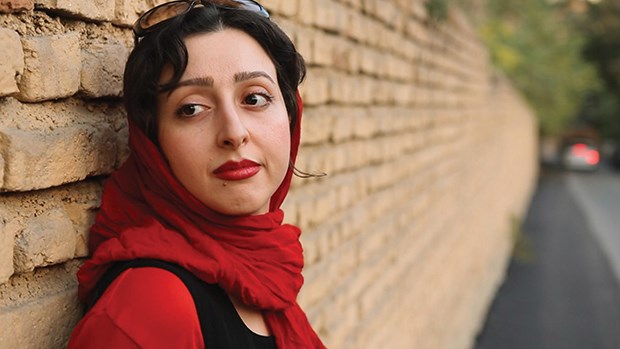No Land's Song. (Iran 2014) Directed by Ayat Najafi. For more information visit viff.org.
Early on in the new Iranian documentary No Land's Song musician Sara Najafi, dressed in her best Persepolis black, enters an elevator in the Ministry of Culture in Tehran and slips a hidden microphone into her clothing as she makes her way up to the fifth floor. The next thing we see is a black screen and a paternalistic male voice explaining to her why it is impossible to present a public concert featuring only women singers.
"Forget it! You know they'll never allow that. .. Let me be frank: The reason for the regime's hard line on your project is the regime has a fundamental problem with female soloists: They don't want women in music at all!" — Ministry of Culture and Islamic Guidance representative
Women musicians performing in public has always been a contentious issue in Iran but prior to the 1979 Islamic revolution it was not an uncommon practice. After that date women were restricted to teaching music and performing only in front of female audiences. Singers, such as Parisa who has performed several times in North Vancouver, can tour the world but inside Iran their activity is severely restricted.
Najafi questioned this practice and with her brother Ayat Najafihas made a documentary about their attempt to produce a public concert featuring only women soloists. Currently studying in Los Angeles, Najafitalked to the North Shore News about the making of No Land's Song prior to its screenings at the Vancouver International Film Festival.
North Shore News: The Iranian regime makes a distinction between women singing solo and in groups. Why is that?
Sara Najafi: I don't know. That was my question too. What is the difference between solo and singing in groups. Nobody answered us. Everybody said, 'That's a problem.' It was a rule of Iran and a rule of Islam. So I said, 'Show me in the Koran, where is it in the Koran?' Nobody could show me. In my opinion I think they are afraid of women. They don't want powerful women. They think if a woman sings on stage after that they will want to take off the hijab. And after that they will want to be president. The (regime) wants to control everything.
North Shore News: At what age did you first realize there were different rules for men and women in Iran?
Sara Najafi: I knew women couldn't sing on the stage from when I was studying in music school. At that time we had other problems. We weren't allowed to carry our own instruments on the streets. My instrument was a piano but my best friend played the violin and she couldn't bring her violin on the street. The police could have arrested her because of that. When I started composing I wanted to have a woman singer. I knew that women can't sing on the stage but I wanted to fight (to change that). I said to myself you have to do it. I went to the Minister of Culture because everything to do with music needs permission in Iran. For example, if you want to release a CD or hold a concert you need permission. I went to the Minister of Culture for permission and they said 'no you can't.' You see how hard it was in the movie.
North Shore News: Several French singers and musicians join you and your Iranian colleagues on stage in Tehran's Roudaki Hall. Considering the pressures everybody was under the actual concert seems to have been exquisitely planned and executed. How did the French musicians get involved in the project?
Sara Najafi: When we first started the project we were sure we wouldn't get permission from the minister. We decided we needed some foreign musicians because they would have to give them permission. My brother went to France and found a music producer and we also found Emel Mathlouthi on YouTube. (The Tunisian Arab Spring singer) lives in France now and her ideas are very close to mine.
North Shore News: How did people learn about the concert?
Sara Najafi: They didn't allow us to sell tickets but we had a page on Facebook and a poster. I think our audience was over 400 and (the authorities) couldn't do anything as the French ambassador came to the concert.
North Shore News: Has your film been shown in Iran?
Sara Najafi: Not yet but it's my hope.



